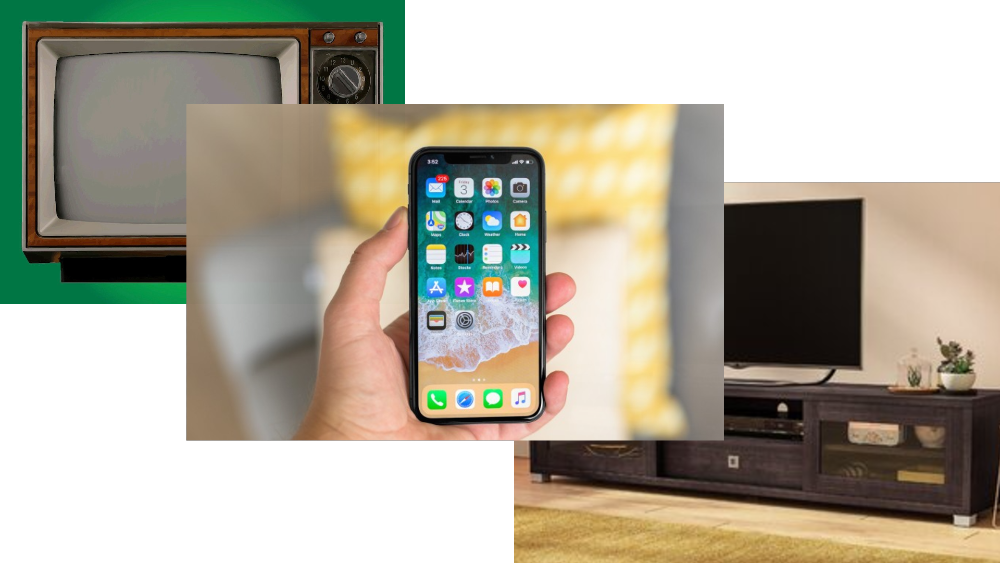 My editor and I got together in the city last week for a drink and to catch up, as it had been a while since we’d seen each other in person. Pandemic, and all. Over cocktails, we discussed the world of entertainment, all that was wrong with it and how we would fix it, and asked each other a few questions here and there to engage the problem solving parts of our brains.
My editor and I got together in the city last week for a drink and to catch up, as it had been a while since we’d seen each other in person. Pandemic, and all. Over cocktails, we discussed the world of entertainment, all that was wrong with it and how we would fix it, and asked each other a few questions here and there to engage the problem solving parts of our brains.
One of the questions he asked me was, “Is it time to get rid of the words ‘TV’ and ‘television’?” It came from a conversation he’d just had with the creator of a successful streaming show we both enjoy, and it made me stop and think about it. My initial, instinctive answer was, “Of course not, that’s ridiculous, because we still call movies ‘films’ even though almost none of them are shot on that anymore.” But then I thought more about it and realized it was a subject worth processing just a bit more.
Let’s talk about the basic, straightforward stuff first. Most of the shows we watch are things we view on an actual television set. It might be a large, flatscreen smart thing that knows what you want to see before you’ve made a decision, but it is, in fact, a TV. Movies, shows, videos, online content, it all shows up now in a way it didn’t even five or six years ago. The technology has advanced to the degree that cable is slowly but surely becoming obsolete, because it’s just so much easier and cheaper to stream stuff from the interwebs to that smart set that is either on the cabinet in your living room or on the wall over your fireplace. Or some other place of honor.
And yet, the truth of the matter is that we’re watching more and more of our content — all of the above named media — on things other than TVs. We watch them on phones or tablets or some other appliance that doesn’t qualify in any way, shape, or form as a television set. Which means that maybe we have to reexamine the parameters by which we judge what TV is and how we consume it.
That’s the nuts and bolts part of the issue, but it goes deeper than that, into a more creative space. Shows are developed for specific streaming services, with stories designed to be consumed in different ways than the ones we saw when we were younger. I grew up in a time when there were three networks and PBS, and the remote control was your father telling you to get up and turn the dial to change the channel from ABC to CBS. Cable came along in the 1980s, with first a punch button keyboard, attached to the TV by a wire, then eventually a remote control and, slowly but surely, more channels, more options, better technology, and so on.
But still, all those shows were broadcast, either over the free airways or on cable. They couldn’t be found anywhere but on that box in your house. A show ended and you waited a week, or a couple weeks, or all summer to see what happened next. If, that is, the story even continued. Serialized storytelling worked differently then, with most episodic series telling a story over the course of a single outing without a lot of carryover. Sure, there was character development and all that, but you didn’t necessarily have the same continuity that you see now, unless it was a specific type of drama, like Dallas or Dynasty. Shows that were glorified soap operas relying on episode-ending cliffhangers to get people to come back the next week.
Interestingly, comic books worked much the same way. I know this seems off topic a bit, but it actually does connect with the main point. When I was growing up reading comics, most of them tended to be one-and-done, even in ongoing series. There weren’t a lot of five, six, eight, ten, or twenty-issue story arcs that built up and culminated in a grand Guignol of climax. A story might roll over two issues, sometimes three, but rarely more than that.
However, as storytelling evolved, and audiences grew more sophisticated in the 1980s and onward, the way creators told their stories — on TV, in comics, and so on — became more sophisticated as well. Flash forward to now. An episode of a given show ends on a cliffhanger that runs directly into the next episode, which doesn’t show up a week from now, but rather ten seconds from now, Yes, I know there are exceptions like Hulu and Disney+ (which still release their shows a week at a time), but apart from cable and broadcast, they tend to be exceptions, More and more of the streamers drop the whole season of a show — or the entire run of a limited series — all at once, giving people a chance to sit down and consume it in one sitting. A sitting, by the way, which can occur whenever we want, thanks to On Demand or one of said online services. For the most part, time periods, assigned moments on the schedule offering the one and only time you are able to view something, are a thing of the past.
It’s one of the reasons why so many creators have gravitated to the smaller screen, because they are not limited to two-hour blocks of storytelling, as they are in the movies. They have more hours with which to work, more leeway to tell a longer story. In some cases, a longer movie is exactly what they’re making. A perfect example is The Falcon and the Winter Soldier, on DIsney+. That was six episodes that essentially split up a four-hour flick for easier consumption, and there are many, many more examples of that exact attitude and philosophy when it comes to this type of serialized storytelling.
And that brings us back to the central question, that being, “What is TV, and can we still call it that?” Even if we factor in the four broadcast networks now, the ones that actually do show up on that set you have placed somewhere in your home, each and every one of them also streams their shows on an external service. ABC and Fox do it on Hulu, CBS on Paramount+, and NBC on Peacock. I watch very little network television anymore, but the few shows I do watch tend to be streamed on my Roku TV or my iPad, rather than on cable. (It was, in fact, this realization that recently made me rethink my attachment to cable TV, but that’s a different conversation.)
Everything we watch, everything we desire to view, is streamed to us, and I’m not aware of any network that doesn’t stream its content into the world, meaning that it’s no longer appropriate to refer to streaming companies as “streamers,” as if they are separate from any other part of the medium. They’re all streamers, all working from the same playbook, and none are really what we think of any more as “TV,” at least in regard to how we’ve always viewed it in the past.
But what else are we supposed to call it? “Streaming content”? That’s dumb. And reductive. Same with “Episodic Storytelling,” which is also a mouthful. And a big yawn.
As humans, we tend to be creatures of habit. We latch onto things, name them for what they are at a given time, and keep referring to them as thus forever, even if the original name no longer applies. Like “glove compartment.” Or “pocketbook.” The same really goes here. We can come up with a snazzy, fancy new name for whatever television has become, but that doesn’t mean people will start using it. Not when they can shorthand it with two letters that rhyme and are easy to say together.
I’m not out to create a problem here, I’m sort of just musing about the new reality of things. TV isn’t really TV anymore, and hasn’t been for a long time. This is true no matter what we choose to call it.
 Neil Turitz is a journalist, essayist, author, and filmmaker who has worked in and written about Hollywood for nearly 25 years, though he has never lived there. These days, he splits his time between New York City and the Berkshires. He’s not on Twitter, but you can find him on Instagram @6wordreviews.
Neil Turitz is a journalist, essayist, author, and filmmaker who has worked in and written about Hollywood for nearly 25 years, though he has never lived there. These days, he splits his time between New York City and the Berkshires. He’s not on Twitter, but you can find him on Instagram @6wordreviews.
You can read a new installation of The Accidental Turitz every Wednesday.





